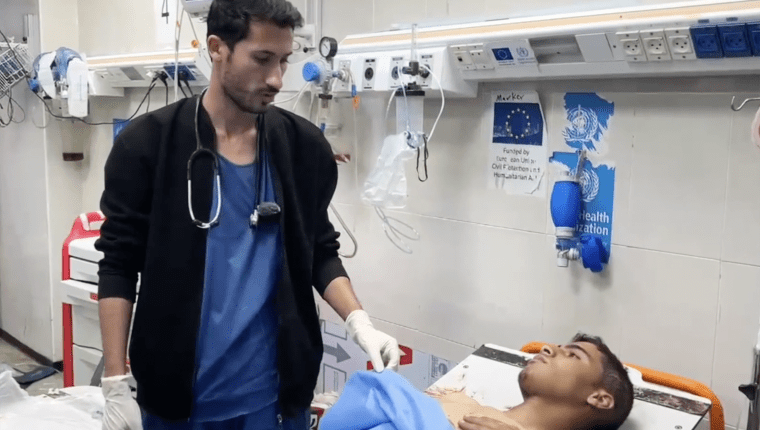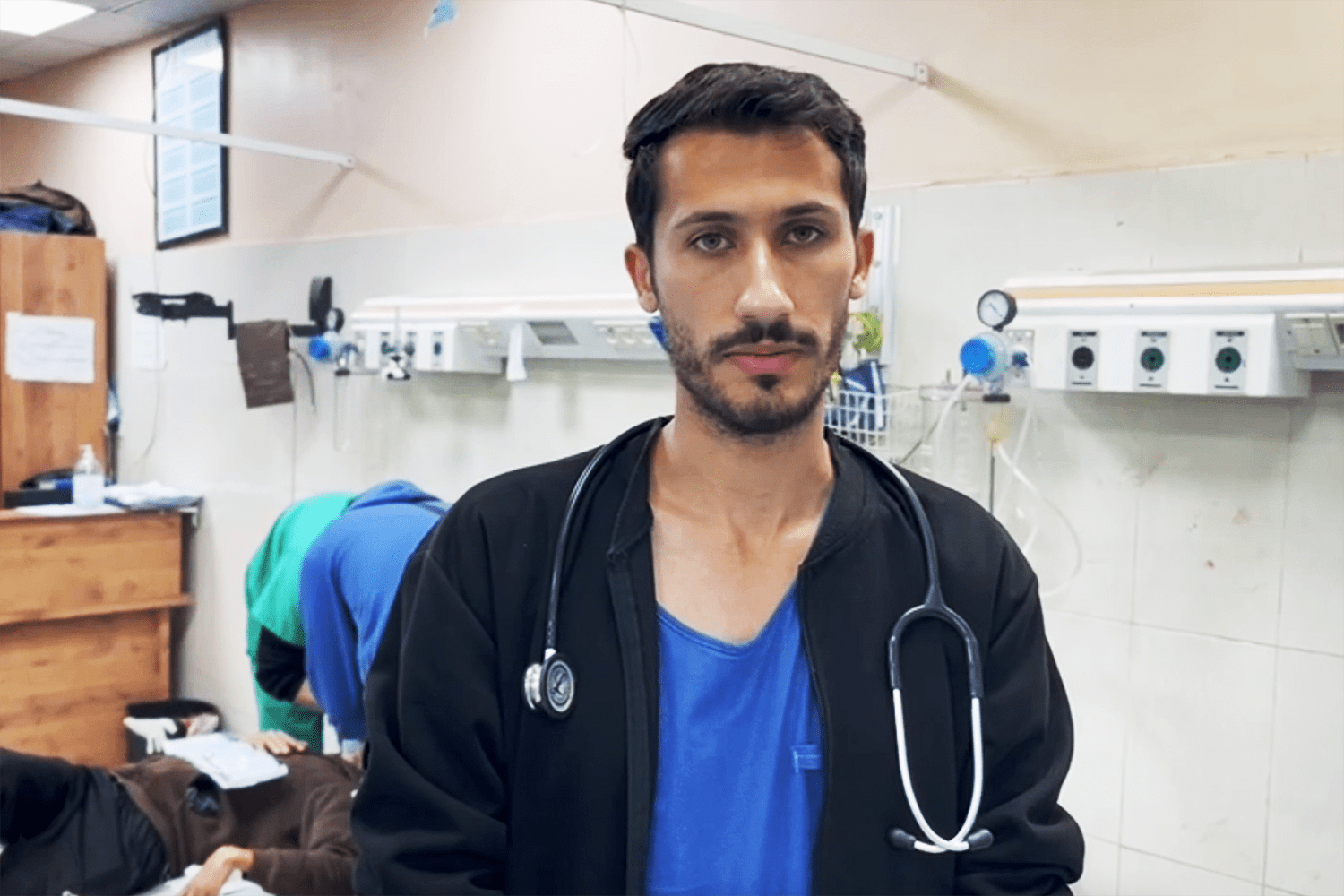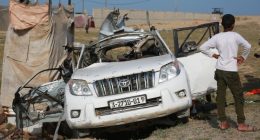Israel has ordered people in parts of Khan Younis, in southern Gaza, to evacuate the area after the military switched focus from the north of the enclave to the south. Thousands of people here have already been displaced at least once, having fled the north when Israel first launched its assault.
The Israeli government and military say they are hunting Hamas fighters in a bid to gut the militant group after its Oct. 7 attack, in which some 1,200 people were killed and another 240 kidnapped.
More than 26,000 people have been killed across Gaza, most of whom are women and children, according to local authorities, whose figures United States and United Nations officials say are accurate.
In Nasser Hospital, “death is everywhere,” Harara said on a recent day this month, when the Israel Defense Forces began to intensify its assault on Khan Younis.
“The situation here is miserable and the smell of death is everywhere,” he told the NBC News camera.
“I feel like the Al-Shifa Hospital scenario is repeating itself,” Harara added, referring to the Gaza City hospital stormed by Israeli troops in November, provoking international shock and alarm.
Israel says Hamas uses hospitals, including Al- Shifa, as militant bases, something Hamas and hospital staff deny. A U.S. intelligence assessment found that Al-Shifa was used to store some weaponry and house command infrastructure.
Harara used to work at that hospital up until he was forced to flee. His family are currently in Rafah, on Gaza’s border with Egypt, but he cannot make the journey to visit them “because of the siege,” he said.
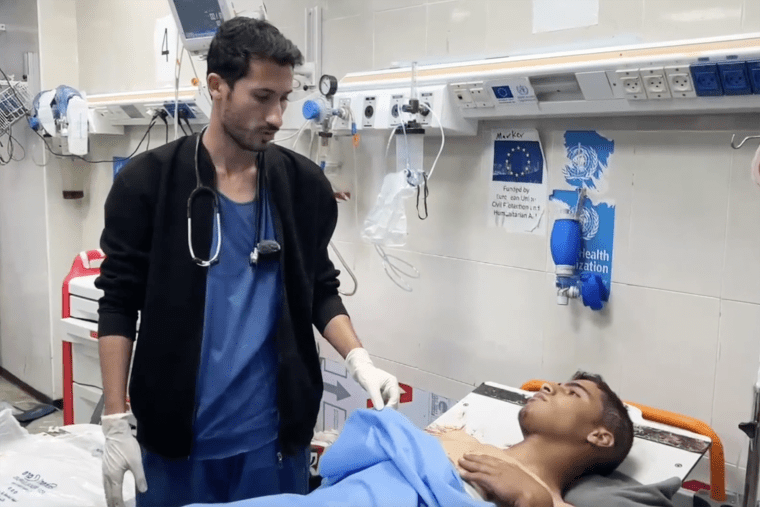
The corridors and rooms in Nasser Hospital are strewn with people, some in well-worn clothes, others in hastily tied medical gowns. Many of the injured are frantic, wide-eyed; others stare vacantly ahead. All await amid a clamor of shouts and groans, punctuated by the metronome beep of hospital machines and the rumblings of bombs and heavy gunfire nearby.
On a recent day this month, Harara wheels a patient through the hospital, a gunshot victim he believes has bleeding inside his chest cavity. A nurse shouts for someone to bring blood; Harara orders a CT scan.
“Today, like other days in this war, I spent all day in the emergency department,” Harara said. “A lot of injured came to the hospital. The situation was very very bad,” he added.
Most of the cases he deals with involve amputations. But it’s not just the wounds from bombs and bullets.
“We lack medical equipment and the simplest medication to deal with pain,” he said . “Many old diseases now appear recently in the hospital due to a lack of hygiene in the families who live in the hospital.”
Giving a snapshot into how fast the situation is deteriorating, cases of diarrhea among children in Gaza rose from 48,000 to 71,000 in just one week in December, Unicef, the U.N. children’s agency, said in a statement this month — equivalent to 3,200 new cases of every day. The prewar average was 2,000 cases per week, according to Unicef.
Its executive director, Catherine Russell, said that Gaza’s children were living through a “nightmare.”
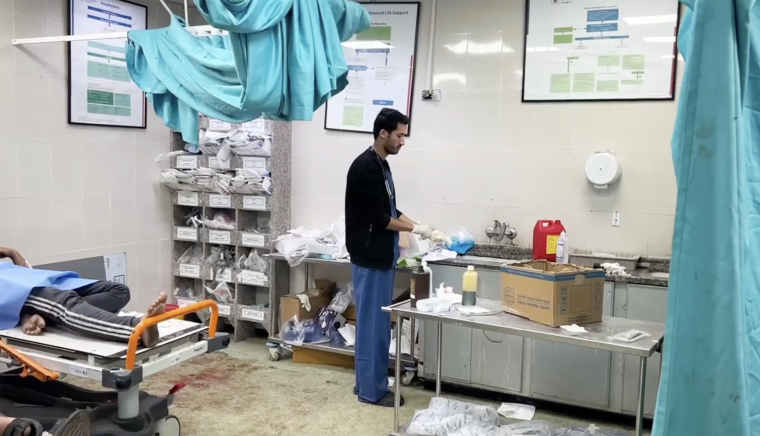
The U.N. and humanitarian groups have criticized Israel’s campaign not only for the high civilian death toll, but its damage and destruction of hospitals, as well as other civilian sites such as schools, mosques and bakeries. Israel blames Hamas, accusing it of hiding its weapons and fighters at these sites and saying that, despite the risk of collateral damage, it has no choice but to target them.
Harara sees the worst of this humanitarian crisis. But his hardship does not end when he leaves the hospital.
His home in Khan Younis is now a thin plastic tarp near the hospital under which he sleeps and eats with other men.
After a day’s work, NBC News recently accompanied him as he walked near the hospital with a friend, chatting and checking the news on his phone. He bought some stale bread and a can of tuna from a young boy who was hawking the tins from a makeshift stall and a busted plastic chair.
He then paid coins to another street trader pouring coffee into see-through plastic cups. Harara may have finished his shift but others had not; ambulances drove by while he bought his evening meal.
Then Harara returned to his tarp to dine. His kitchen was a pop-up table, littered with detritus and meager foodstuffs. The sun was setting and this was his first meal since morning, a fast he broke by mixing the can of tuna and a lime, scooped up with a flat bread.
He made tea on an electric stove powered from the nest of wires and multiplugs dangling precariously in the corner, fueled by what little electricity supply Gazans are still afforded.
“I come to the tent to eat something after hard work in the hospital,” he said with remarkable impassiveness on a day in which he says he saw nine patients die. “I haven’t eaten anything since the start of the day. Now I am very hungry.”
Source: | This article originally belongs to Nbcnews.com
